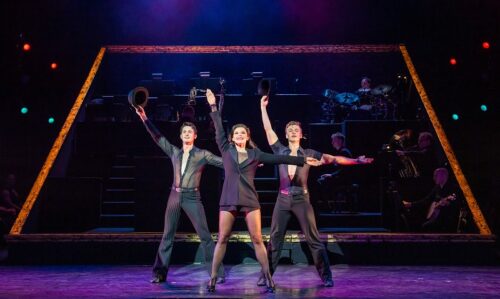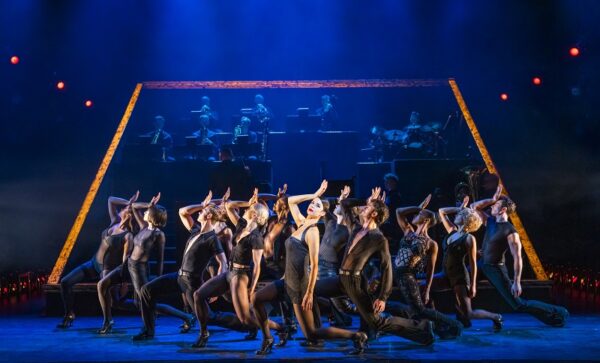 United Kingdom Kander & Ebb’s Chicago the Musical: Cliffs Pavilion, Southend-on-Sea, Essex, 21.2.2022. (JPr)
United Kingdom Kander & Ebb’s Chicago the Musical: Cliffs Pavilion, Southend-on-Sea, Essex, 21.2.2022. (JPr)

With Chicago approaching its 47th anniversary there is little new I can add to the praise it has garnered on Broadway or in countless productions throughout the world. What I can say is that after the last two years most of us have had it brings just the uplift in spirits you – we all? – need. On the day Boris Johnson told England that looking after our health was every individual’s responsibility and not the government’s, at Southend’s Cliffs Pavilion – although masks were recommended – I don’t think I saw anyone wearing one apart from the theatre staff. So is it really back to normal? Let us hope so.
As Mark Fisher reminds us in a programme essay, ‘Chicago in the 1920s was run by gangsters, a time that was half-jazz age and half prohibition-era criminality’. The musical is not an exploration of the actual decadence, debauchery and organised crime of that era but a satire of a corrupt justice system and the cult of the celebrity criminal that arose then. Central to what we see is chorus girl Roxie Hart (based on the real-life Beulah Annan) shoot her lover when he threatens to end their affair. Squirming to avoid the death penalty, Roxie hires Chicago’s most devious – and successful – criminal lawyer, Billy Flynn, to help her convince her hapless and over loyal husband, Amos, as well as the all-important news media, and therefore the public, of her innocence through some lurid front-page headlines. In Cook County Jail she meets Velma Kelly (inspired by Belva Gaertner) who killed her husband and sister when she caught them having sex but claims she has no memory of it due to blacking out. The prison block is presided over by Matron ‘Mama’ Morton who takes bribes off the girls to put them in the public eye and currently she is orchestrating Velma’s acquittal and a return to vaudeville where she used to appear with her sister. However Velma loses the limelight when Roxie comes along and the immoral pair are more concerned with promoting themselves than the perilousness of their life and death situation. Both eventually come to terms with the fickleness of their ‘murderer-of-the-week’ fame and have bonded by the finale. Much fun is had by all along the way and authenticity intrudes only once when a Hungarian inmate is hung (offstage) still protesting her innocence.
So, Chicago is a timeless tale of lust, adultery, jealousy, murder, duplicity, corruption, greed, exploitation and is the second longest-running show ever in Broadway history, behind Andrew Lloyd Webber’s The Phantom of the Opera, while still holding the records for being the longest-running musical revival and longest-running American musical on Broadway. So how has Chicago managed to outlast a vast number of competitors that have come and gone over its four decades and more? Mama Morton begins a philosophical second act number with Velma – appropriately titled – ‘Class’ with the words ‘The whole world’s gone low-brow. Things ain’t what they used to be’. Chicago is a classy musical which razzle dazzles(!) because it proves sometimes you just need a small band playing live on stage – and being part of the show themselves – as well as, its rare confluence of a great songwriting team, John Kander and Fred Ebb, with a legendary choreographer, Bob Fosse. Chicago is therefore an example of musicals as they used to be and maybe are not anymore. After their tremendous success with their 1966 Cabaret, it is the simple cabaret setting of Kander and Ebb’s jazz age follow-up musical – which originated with director Walter Bobbie’s 1996 Broadway revival – that proves how throwing money at sets and costumes isn’t obligatory for a musical to be successful.
I never saw Chicago until its 2002 Oscar-winning film version and then subsequently a London revival with Brooke Shields as Roxie Hart in 2005. However on coming back to it now, happy memories were brought back of one of my greatest theatrical memories when Shirley MacLaine brought what was essential her cabaret show to the London Palladium in 1976. Obviously, the connection between MacLaine and Fosse is well-known and Alan Johnson’s choreography – for what was essentially a one-woman show – was Fosse-esque. For its subsequent CD release from a later run in New York none other than Elton John wrote how he was ‘captivated’ by it (as I had been) and how ‘Every facet of her act was superb — singing, comedy, dancing and most of all warmth and complete mastery of her audience. The lady is quite simply a lesson in professionalism for any other performer.’ Something I agree with and also puts into words my feelings about every member of the company of this current Chicago the Musical revival (creatives and cast listed below) who made this evening at Cliffs Pavilion – with all the routines similarly grounded in vaudeville – equally as memorable as that Palladium performance I saw in the distant past!
Nevertheless Chicago – it must be admitted – is unashamedly old-fashioned now and would anybody condone a new musical today where nearly everyone is impossibly good-looking and many wear William Ivey Long’s tight-fitting, black – frequently sheer and almost non-existent – costumes to heighten the show’s sensualness. However right up to date is the breaking of the fourth wall and there is a lot of joy to be had from the musical numbers being introduced and having the band’s conductor – here the exuberant Andrew Hilton – interact with the cast on and off throughout the musical. Chicago ends wonderfully with characters asking for their ‘exit music’ and to be honest you don’t really want it all to end and how fitting it is for the marvellous band to keep playing on rumbustiously. They are supposedly accompanying the audience as they leave the theatre but nearly everyone stays until they finish.
Revivals of Chicago are (in)famous for a revolving door, castingwise, of its principals and veterans of Broadway and the West End mix with ‘celebrities’ from music, film and TV who appear often in short runs. As long as they bring some individuality to their performance their background is irrelevant. Here an extremely talented, dynamic ensemble is excellent all round. Faye Brookes as Roxie has the engaging sense of mischief of a sexy St Trinian’s sixth former. With the practiced ease of Barbara Windsor in the Carry On films she can ogle the male chorus and later reflect on the qualities of her cuckolded husband by delivering the double entendre ‘he’s greater than the sum of his parts’ whilst acting, singing and dancing up a storm. Jamie Baughan endures all his humiliations stoically as the much put-upon Amos Hart and he elicits a great deal of sympathy with a very affecting ‘Mr Cellophane’ about his perceived invisibility.

The choreography was original revived by Fosse’s muse Ann Reinking, and it is possibly Djalenga Scott as Velma who brings real panache to Fosse’s signature jazz style with some impressive angular poses, twirls, high kicks and a cartwheel. Compared to Roxie, Scott’s Velma is more of a cynical femme fatale and her tour de force is when she tries to persuade Roxie (‘I Can’t Do It Alone’) to recreate her sister act when they are released by breathlessly showing what they both performed.
Of course, Russell Watson has a certain box office appeal, but he was ill and replaced as Billy Flynn by Liam Marcellino. If Watson returns to surpass Marcellino’s suave and debonair performance that should be worth watching. Marcellino was certainly not the world-weary silver fox this character usually is but more of a whip-smart new kid on the block. His stylish singing made ‘All I Care About’ – a Ziegfeld parody number about the lawyer’s love of money – the showstopper it must be with the chorus girls wielding their large ostrich feather fans in familiar Follies fashion.
Completing the principal cast was B E Wong as the tabloid reporter Miss Sunshine. I remembered nothing about the character so the eventual reveal – I will write nothing about it here – came as a great surprise. Suffice to say that Wong brings some unique operatic vocals to ‘A Little Bit of Good’. Sheila Ferguson’s Mama Morton was undoubtedly venal but there seemed to be a heart there somewhere. You could truly believe her when she sang the line ‘I’m the biggest mother hen’ during ‘When You’re Good to Mama’ which wasn’t quite as barnstorming as I suspect it might be from others.
‘All That Jazz’ and more it was a great evening and catch Chicago on tour if you can (for information click here).
Jim Pritchard
Creatives:
Lyrics – Fred Ebb
Music – John Kander
Book – Fred Ebb and Bob Fosse
Original New York Production – Walter Bobbie
Recreation of Original Direction – Stacey Haynes
Original Choreography – Ann Reinking (in the style of Bob Fosse)
Re-creation of Original Choreography – Gary Chryst
Assistant to the Choreographer – Matthew Wesley
Music Director – Andrew Hilton
Orchestrations – Ralph Burns
Scenic Design – John Lee Beatty
Costume Design – William Ivey Long
Lighting Design – Ken Billington
Original Sound Design – Rick Clarke
Recreation of Original Sound Design – Matt Grounds
Cast:
Faye Brookes – Roxie Hart
Djalenga Scott – Velma Kelly
Liam Marcellino – Billy Flynn
Sheila Ferguson – Matron ‘Mama’ Morton
Jamie Baughan – Amos Hart
B.E. Wong – Mary Sunshine
Ishmail Aaron – Ensemble
Michelle Andrews – Ensemble
Gabby Antrobus – Swing / Assistant Dance Captain
Delycia Belgrave – Ensemble
Joel Benjamin – Ensemble
Tanisha-Mae Brown – Ensemble
Daniel Clift – Swing / Dance Captain
Callum Fitzgerald – Ensemble
Emily Goodenough – Ensemble
Billie Hardy – Ensemble
Aaron Jenkins – Ensemble
Theo Reece – Ensemble
Hollie Jane Stephens – Ensemble
Harrison Wilde – Ensemble
